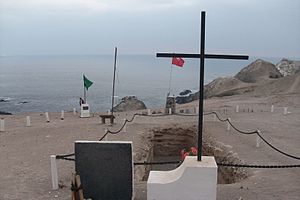
Internment is the imprisonment of people, commonly in large groups, without charges or intent to file charges. The term is especially used for the confinement "of enemy citizens in wartime or of terrorism suspects". Thus, while it can simply mean imprisonment, it tends to refer to preventive confinement rather than confinement after having been convicted of some crime. Use of these terms is subject to debate and political sensitivities. The word internment is also occasionally used to describe a neutral country's practice of detaining belligerent armed forces and equipment on its territory during times of war, under the Hague Convention of 1907.

An authoritarian military dictatorship ruled Chile from 1973 to 1990. The dictatorship was established after the democratically elected socialist government of Salvador Allende was overthrown in a coup d'état backed by the United States on 11 September 1973. During this time, the country was ruled by a military junta headed by General Augusto Pinochet. The military used the breakdown of democracy and the economic crisis that took place during Allende's presidency to justify its seizure of power. The dictatorship presented its mission as a "national reconstruction". The coup was the result of multiple forces, including pressure from conservative groups, certain political parties, union strikes and other domestic unrest, as well as international factors.
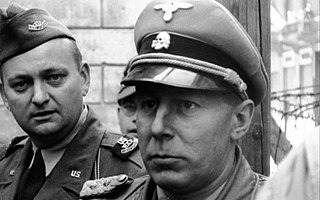
Hermann Julius Walther Rauff, also Walther Rauff was a mid-ranking SS commander in Nazi Germany. From January 1938, he was an aide of Reinhard Heydrich firstly in the Security Service, later in the Reich Security Main Office. He worked for the Federal Intelligence Service of West Germany (Bundesnachrichtendienst) between 1958 and 1962, and was subsequently employed by the Mossad, the Israeli secret service. Sailing to South America in December 1949 and landing in Ecuador, living in Quito. He was described in a documentary on the History Channel as one of the 7 most dangerous Nazis who fled to South America after World War II.

José Toribio Merino Castro was an admiral of the Chilean Navy who was one of the principal leaders of the 1973 Chilean coup d'état, along with General Augusto Pinochet of the Army, General Gustavo Leigh of the Air Force, and General César Mendoza of the Carabineros. Together they established a military dictatorship that ruled Chile from 1973 until 1990, during which more than 3,197 Chilean citizens were executed or simply "disappeared", according to the reports of official bi-partisan commissions established by the President of Chile, Patricio Alwyn, in the 1990s. In addition, a further 28,459 Chileans were victims of torture, which included approximately 3,400 cases of sexual abuse of women.

The Caravan of Death was a Chilean Army death squad that, following the Chilean coup of 1973, flew by helicopters from south to north of Chile between September 30 and October 22, 1973. During this foray, members of the squad ordered or personally carried out the execution of at least 75 individuals held in Army custody in certain garrisons. According to the NGO Memoria y Justicia, the squad killed 97 people: 26 in the South and 71 in the North.

Pisagua is a Chilean port on the Pacific Ocean, located in Huara comuna (municipality), in Tarapacá Region, northern Chile. In 2007, the new Tamarugal Province was established and the comuna of Huara, previously within the province of Iquique, was incorporated to the newly created province.

The military regime in Chile led by General Augusto Pinochet ended on 11 March 1990 and was replaced by a democratically elected government. The transition period lasted roughly two years, although some aspects of the process lasted significantly longer. Unlike most democratic transitions, led by either the elite or the people, Chile's democratic transition process is known as an intermediate transition – a transition involving both the regime and the civil society. Throughout the transition, though the regime increased repressive violence, it simultaneously supported liberalization – progressively strengthening democratic institutions and gradually weakening those of the military.
Raúl Eduardo Iturriaga Neumann is a Chilean Army general and a former member Foreign Affairs Department of the DINA, as an analyst and in the agency's socio-economic intelligence unit, called "Purén Brigade".
Eugenio Berríos Sagredo was a Chilean biochemist who worked for the Dirección de Inteligencia Nacional (DINA). Berríos was charged with carrying out Proyecto Andrea in which Pinochet ordered the production of sarin, a nerve agent used by the DINA. Sarin gas leaves no trace and victims' deaths closely mimic heart attacks. Other biochemical weapons produced by Berríos included anthrax and botulism. Berríos also allegedly produced cocaine for Pinochet, who then sold it to Europe and the United States. In the late 1970s, at the height of the Beagle Crisis between Chile and Argentina, Berríos is reported to have worked on a plan to poison the water supply of Buenos Aires. Wanted by the Chilean authorities for involvement in the Letelier case, he escaped to Uruguay in 1991, at the beginning of the Chilean transition to democracy, and what has been identified as his corpse was found in 1995 near Montevideo.
Carmelo Soria was a Spanish-Chilean United Nations diplomat. A member of the CEPAL in the 1970s, he was assassinated by Chile's DINA agents as a part of Operation Condor. Augusto Pinochet was later personally indicted over this case.
Gerardo Huber Olivares was a Chilean Army Colonel and agent of the DINA, Chile's intelligence agency. He was in charge of purchasing weapons abroad for the army. Huber was assassinated shortly before he was due to testify before Magistrate Hernán Correa de la Cerda in a case concerning the illegal export of weapons to the Croatian army. That enterprise involved 370 tons of weapons sold to the Croatian government by Chile on 7 December 1991, when Croatia was under a United Nations embargo arising from the war in Yugoslavia. In January 1992, Magistrate Correa sought testimony from Huber on the deal. However, Huber may well have been silenced to avoid implicating the Dictator, then-Commander-in-Chief of the Army Augusto Pinochet, who was himself awaiting trial on related charges.
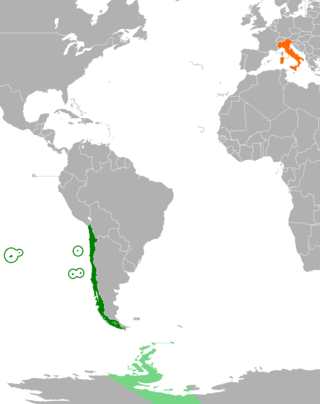
Chile–Italy relations are the current and historical relations between the Republic of Chile and the Italian Republic. The relationship between Chile and Italy is based on a long history of contacts that have taken place at the political level, but also due to the presence of an important Italian community in Chile and Chileans in Italy. Both nations are members of the OECD and the United Nations.
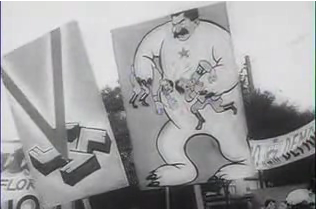
In 1948, on the initiative of Chilean President Gabriel González Videla, the Chilean National Congress enacted the Permanent Defense of Democracy Law, referred to by many as the Damned Law, which outlawed the Communist Party of Chile and banned 26,650 persons from the electoral lists.
The Chilean government has a long-standing history of using political violence against its own citizens. Violence has been used by the government against its people under three different styles of government: parliamentary, presidential and military rule. While Chile has remained stable in the long run, the country has been subjected to intense periods of state sponsored violence.

Human rights abuses in Chile under Augusto Pinochet were the crimes against humanity, persecution of opponents, political repression, and state terrorism committed by the Chilean Armed Forces, members of Carabineros de Chile and civil repressive agents members of a secret police, during the military dictatorship of Chile under General Augusto Pinochet from 1973 to 1990.
The Pisagua Case is the name given to the legal actions taken surrounding the crimes that occurred in the torture center and prison camp installed in the town of Pisagua, during the military dictatorship of Augusto Pinochet in Chile.

Some German Chileans supported Nazism prior to Adolf Hitler's taking control of Germany in 1933, including the National Socialist Movement of Chile (1932–1938). Germany also pursued the Nazification of the German Chilean community. Nazi spy networks operated in the country between 1937 and 1944, and were investigated by the Chilean government until 1947. Other movements related to Nazism continued to operate in the country until the latter half of the 20th century, and former Schutzstaffel (SS) officer Walter Rauff spent his later life there.

LGBT history in Chile encompasses a broad history related to gender and sexuality within the country of Chile. Oftentimes this history has been informed by the diverse forms of governments that have existed within Chile, including colonialism, military dictatorship, and democracy. Global events like the AIDS epidemic also had an impact on Chilean LGBT history. There are also multicultural elements with the different cultural perceptions of gender and sexuality from indigenous groups and Spanish influence.
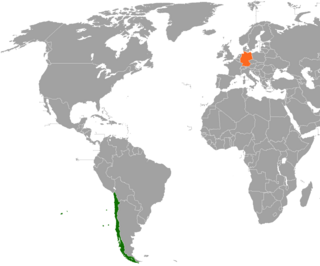
German-Chilean relations are foreign relations between Germany and Chile. Around 12,300 kilometers separate Chile and Germany but both nations still share a wide range of bilateral relations. Over the course of the last 150 years many Germans have settled in Chile for several different reasons. Migrating in the opposite direction, several thousand Chileans sought refuge in Germany during Pinochet's dictatorship.
Miguel Krassnoff Martchenko is a Chilean military official involved in human rights violations during the dictatorship of General Augusto Pinochet. He held several high-ranking positions in the Pinochet regime, including in the Chilean intelligence agency, DINA. As such, he was responsible for the interrogation, torture, and disappearance of political prisoners at the detention center, Villa Grimaldi. After Pinochet's demise, Krassnoff was convicted by Chilean courts of "crimes against humanity".
